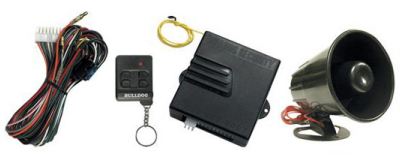Car Alarms
Summary
A car alarm is an electronic device designed to deter vehicle theft. Car alarms sound off when the vehicle sensor detects a vibration, movement, contact or noise. In almost every case, a passing vehicle or other external vibration will set off an alarm. Some vehicles use audible status indicators that make noise whenever there is any vibration or sound outside of the vehicle. Most keyless entry systems use the alarm just to signal the motorist that the alarm is enabled or disabled.
For all the noise they create, there is absolutely no evidence that car alarms work. Auto thieves intentionally trip the car alarm to mask the sound of breaking glass. Thieves can disable an alarm in seconds. People do not respond to car alarms and will take no action to reduce an auto theft in progress.
Better known in the industry as "nuisance alarms", car alarms seriously affect millions of people every day. The noise from car alarms disrupts sleep patterns, productivity and daily life. Car alarms are known to disrupt weddings, funerals and other important moments.
In New York City, parents charged that car alarms are frightening their infants and young children, a time in their lives when they are developing patterns that will last the rest of their lives.
Car Alarm Components

A car alarm system typically consists of a wiring harness, remote transmitter, onboard sensor device and a horn. Most new vehicles include factory installed alarms, which means consumers essentially pay a car alarm tax everytime they make a purchase.
Industry
The largest manufacturers of aftermarket car alarms include Directed Electronics (Viper), Audiovox, Bulldog Security and Crimestopper.
These companies are members of the Consumer Electronics Association (CEA) and the Specialty Equipment Market Association (SEMA). Along with the Mobile Enhancement Retailers Association (MERA) representing dealers and installers, they have lobbied against proposed noise-pollution ordinances in communities across America.
Directed Electronics founder is Darrell Issa. As former chairman of the CEA, Issa has traveled across the country lobbying against proposed noise ordinances. Directed Electronics has made Issa a multi-millionaire and he has parlayed his considerable wealth to gain political office as a two-term Republican Congressman from California.
SEMA published an interview with him called "One of Our Own" about his legislative efforts favorable to their member companies. He is a member of the Congressional Automotive, Performance and Motorsports Caucus, founded by SEMA.
Legislation
In 2004, there was an organized campaign to ban car alarms in New York City. Citizens affected by car alarm noise testified in public hearings and organized public protests in front of City Hall to support the ban.
The New York City Police Department (NYPD) which has oversight of the Department of Environmental Protection (DEP) actually testified against banning car alarms. The NYPD claimed that car alarms would "remove a layer of protection" from motorists property. They could not provide any statistics or findings to show that the alarms were effective in reducing vehicle theft.
The NYPD had previously claimed that car alarms worsened the crime problem in a booklet titled, "Police Strategy No. 5: Reclaiming the Public Spaces of New York," (City of New York, New York, 1994). Because nothing is done about the alarms, the general impression is that no one cares about the neighborhood.
Representatives from MERA, CEA, Directed Electronics, Audiovox and Toyota also testified against the proposed ban. City Hall passed a lame duck law that only prohibits the sale of motion activated alarms and alarms that sound off for more than three minutes.
MERA released a press release taking credit that "the language of the proposed ordinance has been amended to soften the blow to the mobile electronics industry".
Effective Vehicle Protection
There are effective alternatives to car alarms that actually reduce auto theft.
Immobilizers work by disabling the engine unless the correct key code is present. The car cannot be hot-wired as a means to circumvent the device.
An ignition switch is designed to disable the ignition unless a hidden switch is activated. This is an inexpensive solution that is highly effective.
The LoJack vehicle tracking system allows vehicles to be tracked by police after being stolen. The device can be installed in cars, commercial trucks, construction vehicles, and motorcycles. The manufacturer claims a 90% recovery rate resulting in over 180,000 vehicles recovered worldwide.
Silent alarm pagers are designed to alert the owner if the vehicle alarm is tripped. The two-way pagers have remote control functions that allow the owner to reset the alarm.





